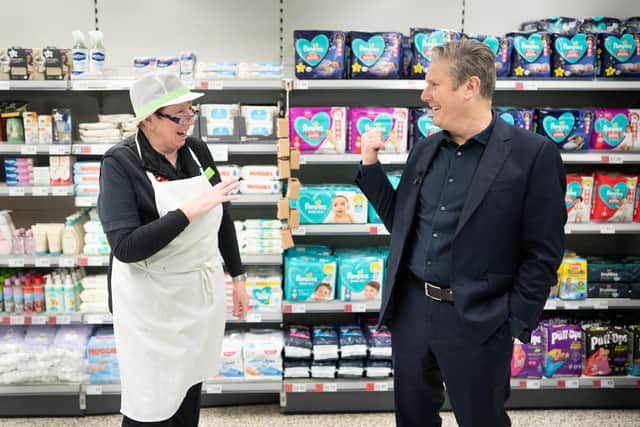Rishi Sunak and Keir Starmer wrong to hijack local elections with national politics: Andrew Vine
They’ve all held one or more of the three seats available over the years, and each has produced conscientious and sensible councillors, so I’m open to persuasion as to who to vote for.
There are a range of local issues that I’d like to see addressed, among them roads in worse condition than some I’ve driven in third world countries, one pothole just having landed me with a £300 bill for a new front suspension mounting on the car.
Advertisement
Hide AdAdvertisement
Hide AdThere is also fly-tipping, maintenance of open spaces, and cuts to services including libraries and leisure centres.


And, of course, what seems to be an increasing anti-car obsession by councils everywhere which seek to make life as difficult as possible for motorists by closing roads and creating tortuous one-way systems, in the hope of forcing people onto bus services which are too often poor.
This is a policy which is rarely, if ever, made explicit in candidates’ manifestos because most of us who drive wouldn’t support it and I want to know where those soliciting my vote stand.
These are strictly local concerns likely to be shared by the residents of any Yorkshire town or city.
Advertisement
Hide AdAdvertisement
Hide AdBut none of the canvassers I’ve encountered has been especially keen to talk about stuff like this. Instead, they’re using the local elections as a proxy for the looming national political tussle at the next general election.
The Labour pitch was that it is time to kick the Tories out. The Conservative pitch was that Labour can’t be trusted with the public finances. The Lib Dem pitch was you can’t trust either of them.
The subject of migrants crossing the Channel has been brought up – by them, not me – as has Boris Johnson and the disaster that was Liz Truss.
Sorry, but those are considerations for another election day, probably in about 18 months’ time, and not for this week.
Advertisement
Hide AdAdvertisement
Hide AdNone of us should be focussing on Rishi Sunak, Sir Keir Starmer or Sir Ed Davey on Thursday, but for candidates who live locally, have a detailed understanding of our neighbourhoods and concerns, and the determination to address them.
It insults my intelligence and that of every other voter to suggest that electing a councillor from a particular party is going to have the slightest bearing on stopping people crossing from France in inflatable dinghies.
This is entirely the wrong way for the main parties to approach local elections, and possibly one of the reasons turnout for them is so appallingly low, as well as being why independent candidates with no party axe to grind often get elected.
More than ever before, these elections are being regarded solely as an indicator of which party leader the country will opt for as Prime Minister in 2024.
Advertisement
Hide AdAdvertisement
Hide AdAll the talk and analysis is of whether the polls on Thursday point to Sir Keir regaining Labour’s red wall seats in Yorkshire and the wider north, or Mr Sunak restoring trust in the Conservatives after Johnson and Truss.
This distracts from the sheer importance of local issues. Both the main party leaders are equally culpable in downplaying how significant these council elections are – and should be – in their own right.
On their whistlestop visits to our part of the country, it has felt like Sir Keir and Mr Sunak are simply taking their clashes in the Commons for an awayday, rather than boosting debate about good local government.
This focus on the national picture risks sending a message to the electorate that it doesn’t really matter who runs the council responsible for their childrens’ school or providing care to the old or vulnerable, and that the only significant consideration is the occupant of 10 Downing Street.
Advertisement
Hide AdAdvertisement
Hide AdThat is not the case, and a couple of pressing issues in Yorkshire provide potent illustrations of that.
In Sheffield, residents will surely have in mind the recent damning report into the council’s scandalous removal of street trees when deciding how to cast their votes.
And in the Tees Valley mayoral election, the mass shellfish deaths that the fishing community is convinced are attributable to dredging for the new Freeport is bound to be on many voters’ minds given the volume of traffic on social media about it.
Local democracy and accountability are of immense importance. They impact everyday lives as least as much as decisions taken on national policy, yet those responsible for running the country – or seeking to do so – are guilty of turning these elections into a sideshow, in which voters are seen as little more than a giant focus group.
We’re not. We’re voting to make the places we live as good as they can be, and that’s what the main parties should keep in mind.